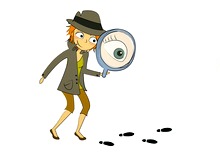| Back to Back Issues Page |
 |
|
English Detective #32, Learning to Ask the Right Questions: Feb. 11, 2014 February 11, 2014 |
The current investigation (Introducing this issue):
This newsletter links to three talks (two quite short—under 10 minutes) on the importance of asking the right questions. Stuart Firestein says that the real work of science is not explaining the universe but asking good questions, seeking the answers, and asking even better questions as a result. He argues that our current education system often destroys student interest in science. We need to excite them instead-- and encourage them to look for answers to what is still unknown, rather than just studying what’s already been discovered.

Your First Clue: Vocabulary Emphasized in this Issue
Review vocabulary: accumulate, apparent, duration, extract, ignorant, plus, scenario, scheme, straightforward, sum Getting the whole story: reading/listening practice:
Click here for Firestein’s talk on the pursuit of ignorance. Here’s the chemistry teacher’s talk. Click here for the explanation of working memory. Follow the Clues (Vocabulary Practice):
Here are some examples and practice with words from Latin verbs of motion. Here is the Kennedy speech gapfill. A note if you get gmail: Have you missed any issues of English Detective? if you find English Detective in your Promotions box, you can move it to your Primary box (if you want) by clicking on it and dragging it there, then clicking Yes when asked if you want to always get it in the Primary box. Coming in the next issue: Mental health: some opinions about research and treatments. In case you missed these: Earlier issues of English Detective have articles on a number of topics, plus practice with all 570 words from the Academic Word List. You can check them out with the link to the back issues page below (or find what words were practiced each issue here. P.S. If youare not already getting English Detective, you can subscribe by completing the form here. (It's free!) |
| Back to Back Issues Page |